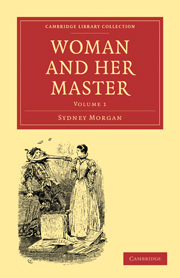Summary
“Ce sexe, que nous bornons a des emplois obscurs et domestiques, ne serait il pas destine a des fonctions plus nobles et plus relevees? N'a–t-il pas donne des exemples de courage, de sagesse, de progres dans toutes les vertus, et dans tous les arts? Peut-être que ses qualites se ressentent de sa faiblesse, et sont inferieures aux nôtres: s'ensuit-il qu'elles doivent être inutiles à la patrie? Non, la nature ne dispense aucun talent pour le rendre sterile; et le grand art du legislateur est de remettre en jeu tous les ressorts qu'elle fournit, et que nous laissons en repos.”
Plato de Republica.—As cited by the Abbé Barthélemy.The chronicles of six thousand years, the records of the known world, lie open for the benefit and the wonder of mankind, preserving, in pages indited by the lights of their respective times, monuments of the ignorance, the timidity, and the credulity, of successive generations.
From the earliest aggregations of society, man, in his shallow pride, has laboured to perpetuate the memory of his own imperfection, the story of his selfishness and his errors; and the annals which he has bequeathed from age to age, for the benefit of posterity, are but evidences of the long and painful struggles, by which the human species, on isolated points, and for periods brief and remote, have succeeded in partially escaping from physical evil, and from moral darkness.
- Type
- Chapter
- Information
- Woman and her Master , pp. 3 - 18Publisher: Cambridge University PressPrint publication year: 2010First published in: 1840

